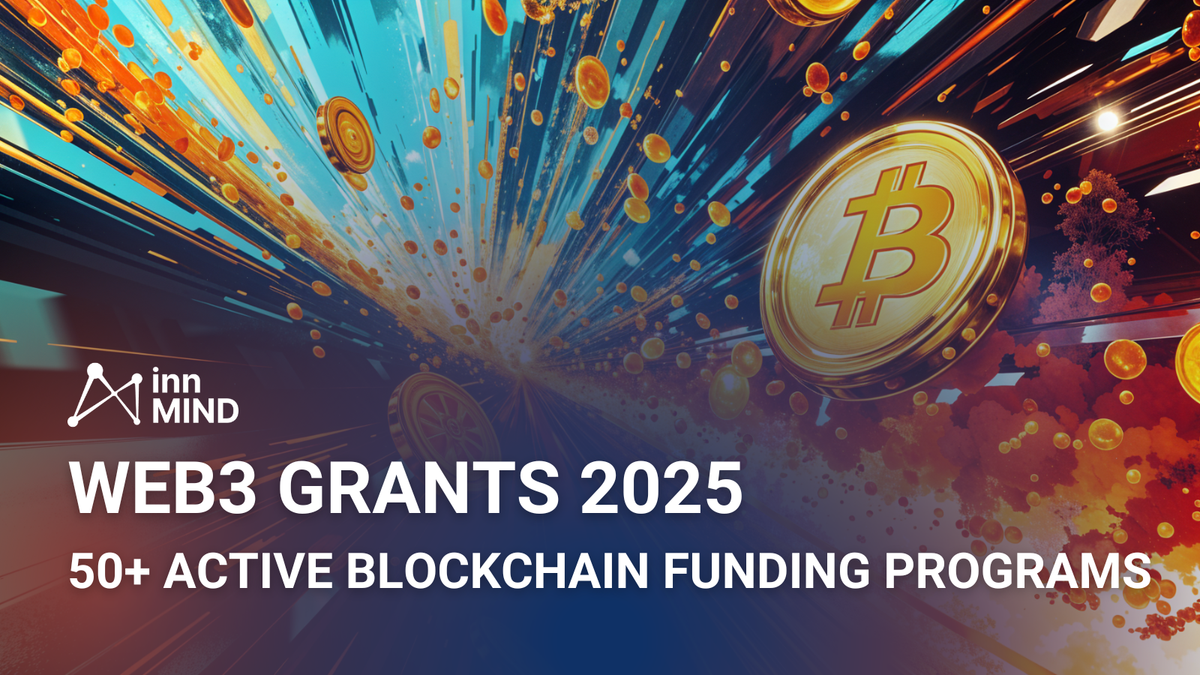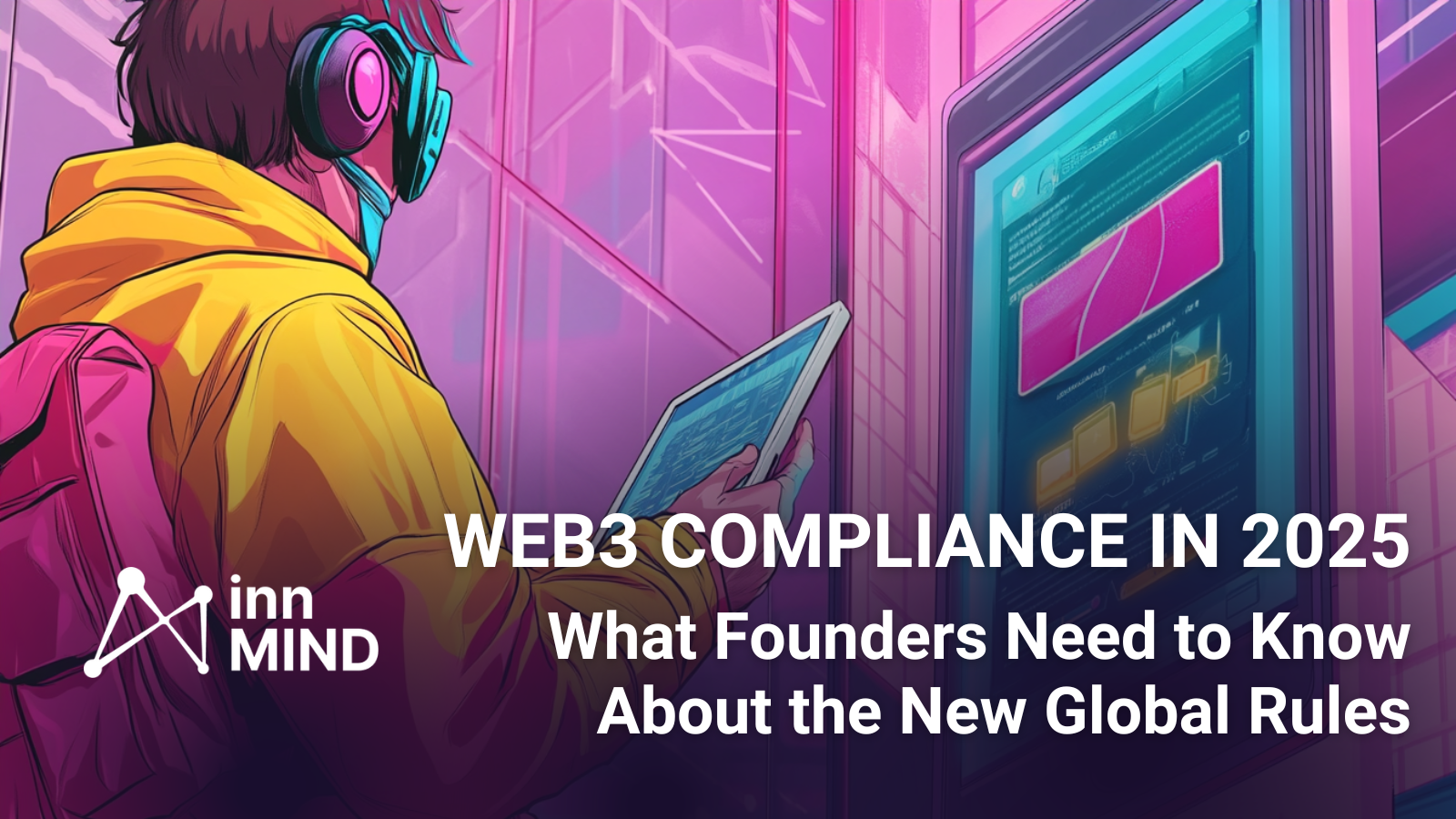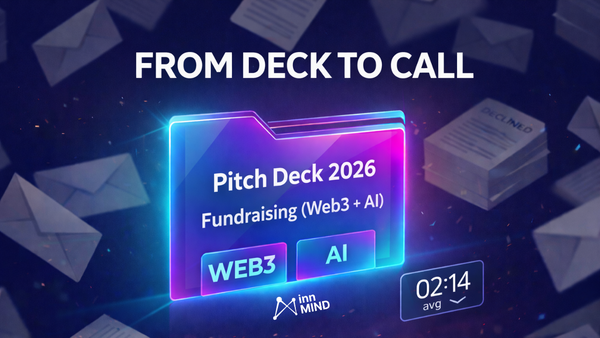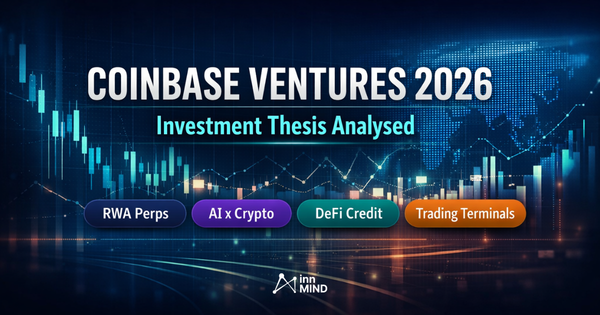Web3 Grants 2025: 50+ Active Blockchain Funding Programs & How to Apply
Funding a Web3 startup in 2025 is harder than ever, but blockchain grants remain a real alternative. This guide covers 50+ active crypto grant programs, common mistakes, and how to maximise your fundraising with InnMind’s up-to-date list.

Updated: 1 Dec 2025. We regularly verify startup grant programs (removing dead links and adding new grants).
TL;DR: Top picks this month
- Ethereum Ecosystem Support Program: $10k–$250k for open-source & public goods.
- Base Builder Grants: micro-grants (1–5 ETH) for live MVPs on Base.
- Core Foundation Grants Program: grants (variable) for early-stage teams and projects already live on Core.
- Interchain Foundation (Cosmos/IBC): CHF 50k-300k for infra & tooling.
- Oasis Ecosystem Grants: from $10k; strong for privacy/DeFi on Sapphire.
👉 Want the full, sortable list? Open the Ultimate 2025 Grants List
If you’re on this page, you know firsthand that raising funds for a web3 startup in 2025 is tougher than ever, even compared to a deep bear market.
The traditional venture capital market is at a standstill: investors are cautious (or illiquid), deal flow is slow, and founders everywhere are searching for any alternatives to access $$.
Many promising blockchain and crypto startups are struggling not because of a lack of talent or vision, but because the right funding to sustain a runaway and development costs just isn’t accessible these days.
Grants from blockchain ecosystems could be an alternative. But when you start looking for grants, the process is rarely straightforward. Most lists are outdated, links are dead, and you waste hours digging through forums or announcements only to find that the opportunity is long gone. Requirements are stricter than before, and nobody teaches you how to navigate all the new hoops.
For most founders, searching for a grant feels like a second full-time job - time better spent building your product and growing your user base.
That’s why the InnMind team collected 30+ active grant programs to help you find real, non-dilutive funding opportunities for your startup in 2025, without wasting weeks on research.
Top web3 grants (curated highlights)
Here are five of the most interesting and diverse grant programs featured in this year’s list:
1. Ethereum Ecosystem Support Program
Grant amount: $10,000 – $250,000
Main requirements: Open-source code, a clear public-goods impact, and a detailed milestone plan.
The Ethereum Foundation funds projects that advance the Ethereum ecosystem, including core infrastructure, tools, and research. This is the go-to grant for teams building directly on Ethereum with a strong technical and community focus.
2. Base Builder Grants
Grant amount: from 1 to 5 ETH (micro-grants)
Main requirements: MVP or prototype live on Base, small team, clear use case, and quick application.
Base’s grant program is designed for early-stage teams launching new ideas or experiments on Coinbase’s L2. Even if you’re starting, you have a shot— show real potential and a working demo.
3. Core Foundation Grants Program
Grant amount: Variable
Main requirements: Must be Core-native or commit to deploy; clear contribution to TVL, users, infra or tooling.
There is no public hard cap per project in the program; builder grants are usually 5-figure amounts, while growth grants are larger (pooled fund, milestone-based).
4. Interchain Foundation Grants
Grant amount: $50,000 – $300,000 CHF
Main requirements: Must build on Cosmos/IBC, open-source license, strong technical proposal, and community value.
Interchain Foundation supports research, infra, and public goods that advance the Cosmos and IBC stack, especially cross-chain solutions and developer tooling.
5. Oasis Ecosystem Grants
Grant amount: From $10,000 (plus liquidity support for DeFi projects)
Main requirements: Deployment on Sapphire ParaTime, focus on privacy/DeFi, transparent budget, and milestone-based deliverables.
Oasis backs privacy-first and DeFi projects using their confidential smart contract technology, offering both grants and liquidity incentives for high-impact dApps.
Common Mistakes Founders Make When Applying for Blockchain Grants
Even with the perfect list of active blockchain grants, many startups stumble during the application process. Here are some of the most common mistakes web3 founders make when trying to secure non-dilutive funding—and how to avoid them:
1. Applying to the Wrong Grants
Founders often send mass applications to every program they find, regardless of relevance. This leads to quick rejections.
Fix: Only apply to grant programs where your startup’s product actually builds (deploy on-chain) on or benefits that ecosystem + matches their ecosystem focus (infra, DeFi, gaming, or RWA, etc.). Prioritise quality over quantity: one deeply relevant, well-crafted application beats ten generic ones.
2. Ignoring the Fine Print
Many teams overlook specific requirements, such as open-source licensing, residency, or prior milestones, buried in the guidelines.
Fix: Treat each grant’s guideline document like a contract. Highlight every requirement (eligibility, deliverables, reporting) and prepare proof or documentation for each before you hit “Submit.”
3. Vague or Generic Applications
Copy-pasting the same application everywhere rarely works. Grant reviewers want to see a clear impact, well-defined milestones, and why your project matters for their ecosystem.
Fix: Customise every proposal to the host chain’s mission: by highlighting specific ecosystem gaps you’re filling, measurable outcomes, and why your project is strategically valuable for their community.
4. Weak Documentation and Pitch
Some founders underestimate the importance of a clear roadmap, a budget, and a team track record.
Fix: Attach a short, visual deck (10–12 slides max) that clearly shows your problem, product, traction, milestones, and budget use. Keep one sentence per slide and link to a live demo or GitHub repo: clarity converts.
5. Missing Deadlines and Updates
Fast-changing grant windows mean some startups send late or incomplete applications, or ignore new requirements.
Fix: Keep a shared grant tracker spreadsheet or Notion board with deadlines, contacts, and statuses. Review it weekly. Set Google Calendar reminders two weeks and two days before each submission window closes.
6. Neglecting Follow-Up or Communication
Founders sometimes disappear after submitting, leaving follow-up requests or feedback from grant committees.
Fix: Treat grant managers like future investors: respond to follow-ups within 48 hours, thank them for feedback, and provide progress updates. A responsive applicant often wins simply because others ghosted.
7. Forgetting About Community Involvement
Blockchain ecosystems value community support and real user traction. Grants often go to projects active in Discord, Twitter, or GitHub discussions.
Fix: Actively engage in the chain’s community spaces before and after applying. Join discussions, share dev updates, and help other builders: genuine participation turns you from a random applicant into a known insider.
By avoiding these pitfalls, your startup can stand out and significantly improve its odds of securing blockchain grant funding.
Your Shortcut to Real Blockchain Funding: The Ultimate Grant List
With so many obstacles in the way, what you need isn’t another generic or outdated spreadsheet, but a reliable and actionable shortcut. That’s why we created the Ultimate List of 50+ Blockchain Grants for Startups 2025.
What makes our list different?
- Only active, hand-checked grants focused on blockchain, crypto, and web3 for 2025: no generic tech, no dead ends, no fake listings.
- Each program is carefully described, including eligibility criteria, funding amounts, deadlines, and unique details, so you can see at a glance which fits your project.
- Most importantly, you get direct, verified application links: no more digging through Discords, Twitter threads, or closed forms.
- The list is structured for easy filtering by blockchain ecosystem, grant amount, and requirements.
How can you use it to maximise your fundraising?
- Download the list and filter by ecosystem, grant size, or specific requirements.
- Review what’s relevant for your team and product—eligibility, deadlines, all the practical info you need to move forward.
- Use the direct links to apply instantly to the best-matching programs.
- Track your applications, mark key dates in your calendar, and build a real funding pipeline that helps you grow faster, without the endless research.
The Ultimate List of Blockchain Grants for Startups 2025 is your one-stop resource to save weeks of work and avoid missing opportunities that could define your next stage of growth. Inside, you’ll find only what’s current, real, and designed for web3 builders—no closed doors, no noise, just verified, ready-to-use info.
Get the full list in our Knowledge Base and take your fundraising from stressful to strategic. Apply, get funded, and keep building.
This could be your best shot at securing funding this year—don’t waste it chasing dead links or relying on guesswork.
FAQs: Web3 & Crypto Startup Grants (2025)
Are Web3 grants free money or do they take equity?
Most blockchain grants are non-dilutive — you keep 100% equity. Some combine cash with credits or liquidity support.
Who can apply for blockchain ecosystem grants?
Founders, developer teams, DAOs or small companies that build on or integrate with a specific blockchain (Ethereum, Base, Cosmos, Immutable, Oasis).
What’s the average grant size in 2025?
From micro-grants (1–5 ETH or $5–10k) up to $250–500k for infrastructure or public-goods projects.
How long does approval usually take?
2–12 weeks, depending on the ecosystem’s review cadence and committee workload.
Do I need a live product to apply?
For micro-grants — often no. For larger ones — usually yes (MVP, open-source repo, or a deployed build).
How do grants help with fundraising?
Winning a respected ecosystem grant (e.g., ESP/Base) is social proof; it improves credibility with VCs later.
Can I apply for multiple grants simultaneously?
Yes — tailor each proposal to the host chain and avoid overlapping milestones.
Read also:








